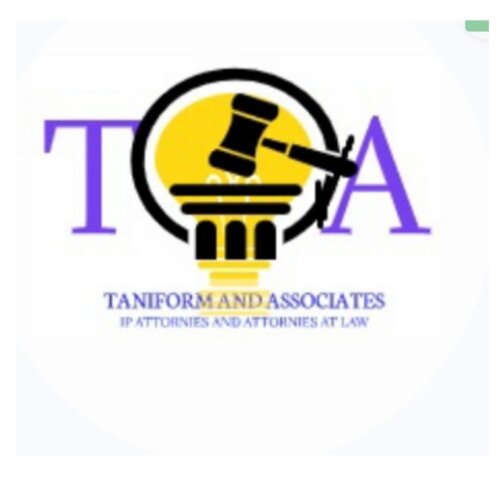Best Tax Increment Financing Lawyers in Cameroon
Share your needs with us, get contacted by law firms.
Free. Takes 2 min.
Or refine your search by selecting a city:
List of the best lawyers in Cameroon

Taniform and Associates IP Attorneys and Attorneys at Law
15 minutes Free ConsultationLegal guides written by CHI & Partners Law Firm:
- Ship Registration in Cameroon
About Tax Increment Financing Law in Cameroon
Tax Increment Financing (TIF) in Cameroon is a financial tool commonly used to promote economic development, particularly in urban or underdeveloped areas. By utilizing the future projected increase in property taxes-which is a result of improved property value due to development projects-TIF enables municipalities to fund public infrastructure and improvements upfront. The idea is to leverage this financial mechanism to support development without directly impacting current taxpayers.
Why You May Need a Lawyer
Navigating the complexities of Tax Increment Financing can be difficult without professional legal assistance. Common situations where legal advice might be necessary include:
- Understanding and evaluating TIF agreements and proposals.
- Ensuring compliance with all local and national regulations.
- Negotiating terms with developers and municipal authorities.
- Addressing community concerns or opposition regarding TIF projects.
- Assessing the financial and legal risks involved in TIF projects.
An experienced lawyer can provide guidance tailored to your specific situation, ensuring that the interests and goals of all stakeholders are adequately represented and protected.
Local Laws Overview
The legal framework governing Tax Increment Financing in Cameroon is comprised of several key components:
- Municipal Authority: Local governments have the authority to establish TIF districts. They initiate the process by identifying and approving districts that require development.
- Project Approval: Before actions are taken, detailed development plans must be presented and approved by relevant authorities. This includes outlining the expected benefits and financial projections.
- Financial Management: Regulations require transparent management of TIF funds. An annual audit and public reporting ensure accountability.
- Public Involvement: Community input is often required through public hearings to gauge support and address concerns related to proposed TIF projects.
Frequently Asked Questions
What is the primary purpose of Tax Increment Financing?
TIF is primarily used to stimulate economic growth in areas that are blighted, underdeveloped, or require revitalization by financing public infrastructure improvements.
Who initiates a TIF project?
Typically, the local government identifies a need for development and initiates the TIF process, sometimes in partnership with developers.
What kinds of projects can be funded by TIF?
TIF can fund a variety of public projects, including roads, utilities, parks, and other infrastructure improvements that support private development.
How does TIF impact existing taxes for residents?
TIF uses the increased tax revenue from the enhanced value of properties post-development, not current tax levies, minimizing the direct impact on existing taxpayers.
How long does a TIF district last?
The duration of a TIF district varies, typically lasting between 15 to 30 years, depending on local regulations and the specifics of the project.
Is public approval required for a TIF project?
Yes, public hearings and community engagement are often part of the TIF approval process to gather input and address concerns.
What are the risks associated with TIF?
Risks include overestimating the increment in tax revenues, potential displacement of current residents, and the economic feasibility of the project.
How can a lawyer help in a TIF project?
Lawyers can help by drafting and reviewing agreements, ensuring legal compliance, negotiating terms, and representing stakeholders in disputes.
Can TIF be used for residential development?
While traditionally used for commercial and industrial development, TIF can also support residential projects that contribute to economic revitalization.
Are there alternatives to TIF for financing development?
Alternative financing methods include grants, bonds, or private investment, each with its own advantages and constraints compared to TIF.
Additional Resources
For more information or assistance regarding TIF in Cameroon, consider the following resources:
- Local Government Development Association
- Cameroon Ministry of Finance - Infrastructure Department
- Chambers of Commerce in Cameroon
- Non-profit organizations focused on urban development
- Legal firms specializing in municipal finance and development
Next Steps
If you need legal assistance in the field of Tax Increment Financing, follow these steps:
- Research and identify qualified lawyers or law firms with expertise in TIF and municipal finance.
- Schedule consultations to discuss your specific needs and obtain professional advice.
- Prepare all necessary documentation and information related to the TIF project for review.
- Engage a lawyer to guide you through the negotiation, compliance, and implementation phases.
Remember, proactive legal consultation can prevent potential complications and ensure the success of your TIF project in Cameroon.
Lawzana helps you find the best lawyers and law firms in Cameroon through a curated and pre-screened list of qualified legal professionals. Our platform offers rankings and detailed profiles of attorneys and law firms, allowing you to compare based on practice areas, including Tax Increment Financing, experience, and client feedback.
Each profile includes a description of the firm's areas of practice, client reviews, team members and partners, year of establishment, spoken languages, office locations, contact information, social media presence, and any published articles or resources. Most firms on our platform speak English and are experienced in both local and international legal matters.
Get a quote from top-rated law firms in Cameroon — quickly, securely, and without unnecessary hassle.
Disclaimer:
The information provided on this page is for general informational purposes only and does not constitute legal advice. While we strive to ensure the accuracy and relevance of the content, legal information may change over time, and interpretations of the law can vary. You should always consult with a qualified legal professional for advice specific to your situation.
We disclaim all liability for actions taken or not taken based on the content of this page. If you believe any information is incorrect or outdated, please contact us, and we will review and update it where appropriate.
Browse tax increment financing law firms by city in Cameroon
Refine your search by selecting a city.















